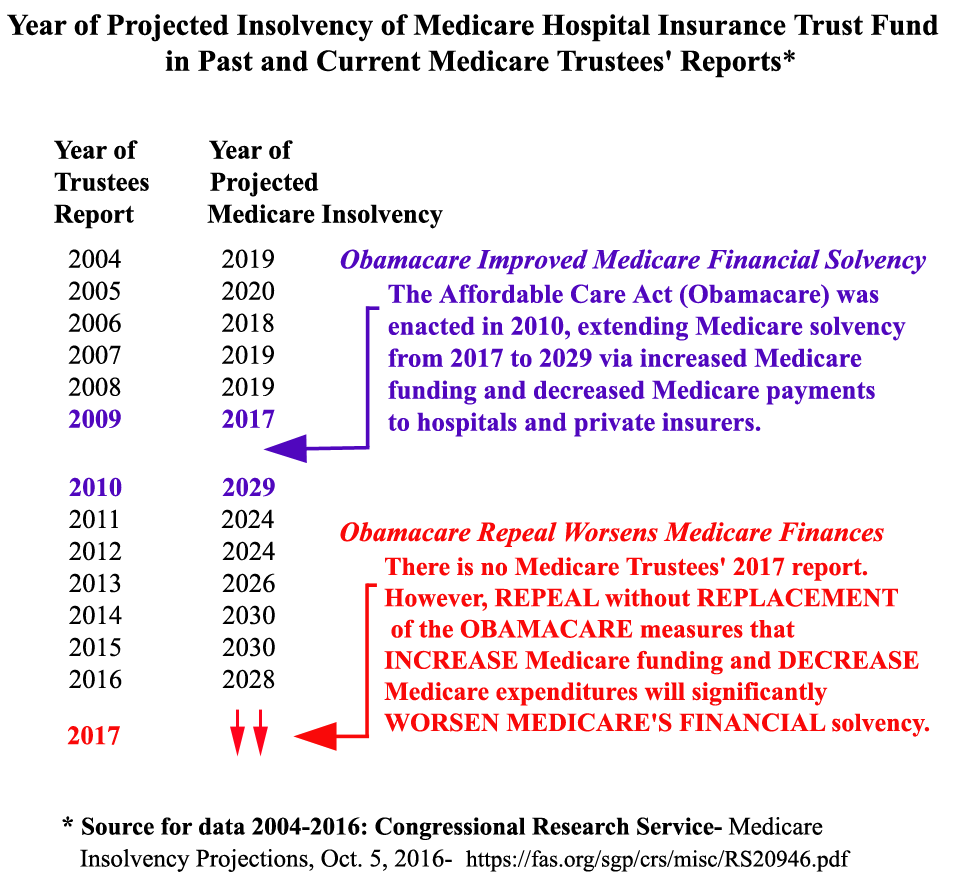
Repealing Obamacare Financially Weakens Medicare
Eric Roehm, M.D. March 2017
Despite efforts by some to characterize the improvements in Medicare’s finances with Obamacare as illusory, whenever an entity’s funding increases and outgoing payments decrease, finances are improved.
1. Medicare finances have substantially improved with the following measures in the Affordable Care Act (Obamacare). Medicare funding has been increased and some of Medicare’s payments to hospitals and private insurers have been decreased.
The Affordable Care Act (Obamacare) increases Medicare funding. There is a 0.9% Medicare tax on annual individual incomes greater than $200,000 ($250,000- married filing jointly) going to the Medicare Hospital Insurance Trust Fund, which improves Medicare’s finances. (There is also a 3.8% tax on high dollar amounts of unearned investment income, but this money does not go to Medicare. The 3.8% tax doesn’t hurt Medicare, nor does this tax specifically help Medicare’s finances. The 3.8% tax was used to help finance and provide care for lower income individuals.)
Obamacare has decreased Medicare’s payment to hospitals, as well as decreased the amount of excess payments beyond the cost of a typical Medicare patient paid to private insurance companies for providing Medicare Advantage plans (Medicare Part C).
2. Medicare finances have substantially improved with the measures in the Affordable Care Act (Obamacare). The Affordable Care Act contained Medicare legislation that increased Medicare funding and decreased Medicare’s costs. Medicare financial solvency has been extended from 2017 to 2028 with the passage of Obamacare, an 11 year increase. (p.4 of Congressional Research Service report) If Obamacare is repealed without replacing the measures in Obamacare that help Medicare’s finances, Medicare’s financial solvency will substantially decrease.
The date that Medicare is described as becoming financially insolvent does not mean Medicare goes bankrupt or that there are no funds available to pay for benefits. Medicare insolvency means that there are no longer sufficient funds to meet 100% of the Medicare Trust Fund obligations. Revenue will continue to flow into the Hospital Trust Fund
Medicare has two Trust Funds. The Medicare Hospital Insurance Trust Fund (HI) pertains to Medicare Part A (includes hospital stays). That is the part of Medicare that can become financially insolvent. The Medicare Supplementary Medical Insurance Trust Fund (SMI) provides money for Medicare Part B (outpatient) and Part D (pharmacy). The premium of enrollees funds approximately 25% of the SMI fund with the remainder coming primarily from government general revenues without any specific restriction upon amounts. (Medicare Parts A, B, C, & D described.)
The Medicare Board of Trustees each years issues a report on Medicare’s finances, including the financial solvency of the Medicare Hospital Insurance Trust Fund (HI). Over the 50 year history of Medicare, Medicare financial solvency projections have ranged from 2-30 years with Medicare’s financial solvency having been extended a number of times, primarily due to legislative changes that had the effect of restraining growth in program spending.
3. The overall effects of Obamacare on Medicare beneficiaries have been positive. The Affordable Care Act (Obamacare), as previously noted, has improved Medicare’s financial solvency substantially. There has also been a reduction in the size of the prescription “donut hole” and better coverage for preventive visits for Medicare beneficiaries. (The prescription donut hole is scheduled for elimination by 2020 by statues within the Affordable Health Care Act.) The reduction in the over 100 billion dollars of excessive payments previously made to the Medicare Advantage programs has made the Medicare program more financially secure for all participants.
www.NutritionHeart.com/Medicare-at-Risk

